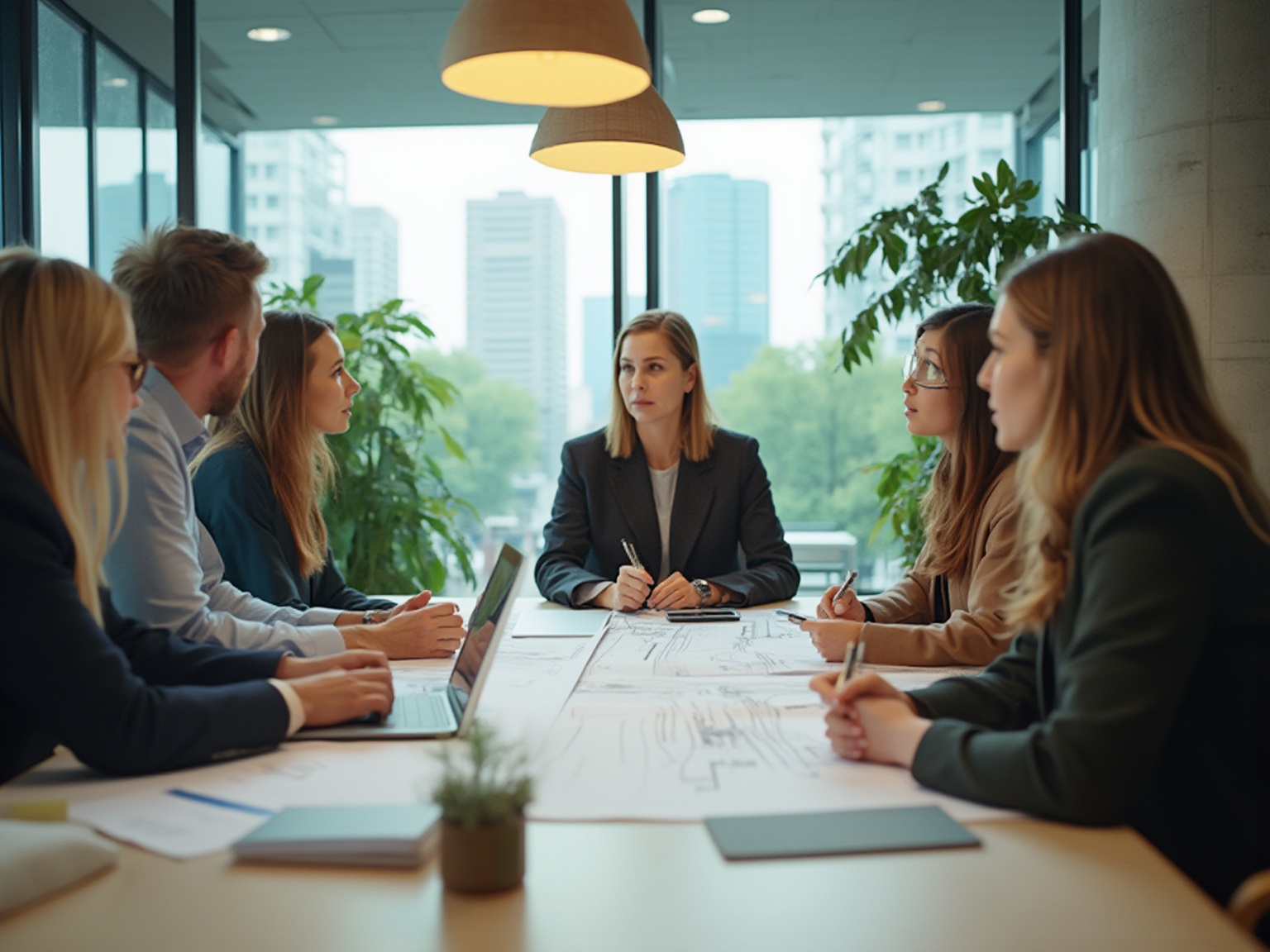27 Mar 2025
BlogOverview
The role of a sustainable building consultant is pivotal in steering clients toward environmentally responsible design and construction practices. These professionals ensure compliance with essential regulations and facilitate the achievement of certifications such as BREEAM.
As the demand for sustainable practices surges, particularly among younger generations, these consultants are increasingly acknowledged as indispensable allies. They navigate the complexities of eco-friendly development, significantly enhancing project viability and marketability. This growing recognition underscores their critical contribution to the future of sustainable construction.
Introduction
As the world grapples with the pressing challenges of climate change and resource depletion, the construction industry finds itself at a critical crossroads. Sustainable building consulting has emerged as a beacon of hope, guiding developers and organisations toward environmentally responsible practices that not only comply with stringent regulations but also resonate with an increasingly eco-conscious public.
How can we optimise energy efficiency and select sustainable materials? These consultants play a vital role in shaping the future of construction. As demand for green buildings surges, driven by younger generations advocating for sustainability, the expertise of consultants becomes indispensable in navigating the complexities of sustainable design and construction.
This article delves into the transformative impact of sustainable building consulting, exploring its key services, benefits, and the future trends that promise to redefine the industry.
Understanding Sustainable Building Consulting
A sustainable building consultant plays a pivotal role in advising clients on the environmentally responsible design, creation, and operation of structures. At Edmond Shipway, this entails the meticulous selection of eco-friendly materials, optimisation of energy efficiency, and strict adherence to environmental regulations. Our environmental consultants are essential in steering projects toward obtaining prestigious certifications, such as BREEAM (Building Research Establishment Environmental Assessment Method), which recognise buildings that meet rigorous environmental standards.
The function of sustainable building consultants extends far beyond mere compliance; they provide invaluable expertise that aids clients in navigating the intricate landscape of eco-friendly design and construction. As the demand for sustainable practices escalates, particularly among younger generations, with 54% of Gen Z and 48% of millennials actively urging their employers to adopt green initiatives, sustainable building consultants at Edmond Shipway are increasingly recognised as vital partners in the building process. ‘The Sustainability Surge’ is reshaping a competitive landscape, underscoring that the true winners will be those who excel in recruitment, address workforce challenges, and integrate digital tools and AI into their services.
Current trends indicate a significant transformation within the industry, with global ESG (Environmental, Social, and Governance) assets projected to reach £40 trillion by 2030, representing over 25% of total global assets under management. This surge emphasises the growing importance of sustainability in real estate and development, compelling companies to adapt to evolving market trends and technological advancements.
Successful eco-friendly projects often exemplify the effectiveness of consulting practices. For example, the surge in mergers and acquisitions in the construction sector, 528 completed deals amounting to over £38 billion between August 2023 and July 2024, illustrates a trend toward consolidation aimed at enhancing control over production and diversifying offerings, particularly in renewable energy and clean construction sectors. This trend may elevate the demand for sustainable building consultants, as firms seek to incorporate eco-friendly construction practices into their expanded portfolios.
The impact of eco-friendly consulting on environmental compliance is profound, as these advisors ensure that projects not only satisfy regulatory requirements but also contribute positively to the environment. As the industry progresses toward a future where sustainability is not merely an option but a necessity, the role of a sustainable building consultant becomes increasingly critical. By embedding sustainable practices into the core of development projects, Edmond Shipway’s sustainable building consultant team aids in creating structures that are not only viable but also beneficial to society and the planet.
Moreover, our Mechanical and Electrical Consultants play a vital role in enhancing energy efficiency and reducing CO2 emissions, while our legacy in cost consultancy guarantees comprehensive support for our clients in understanding potential risks associated with their properties.
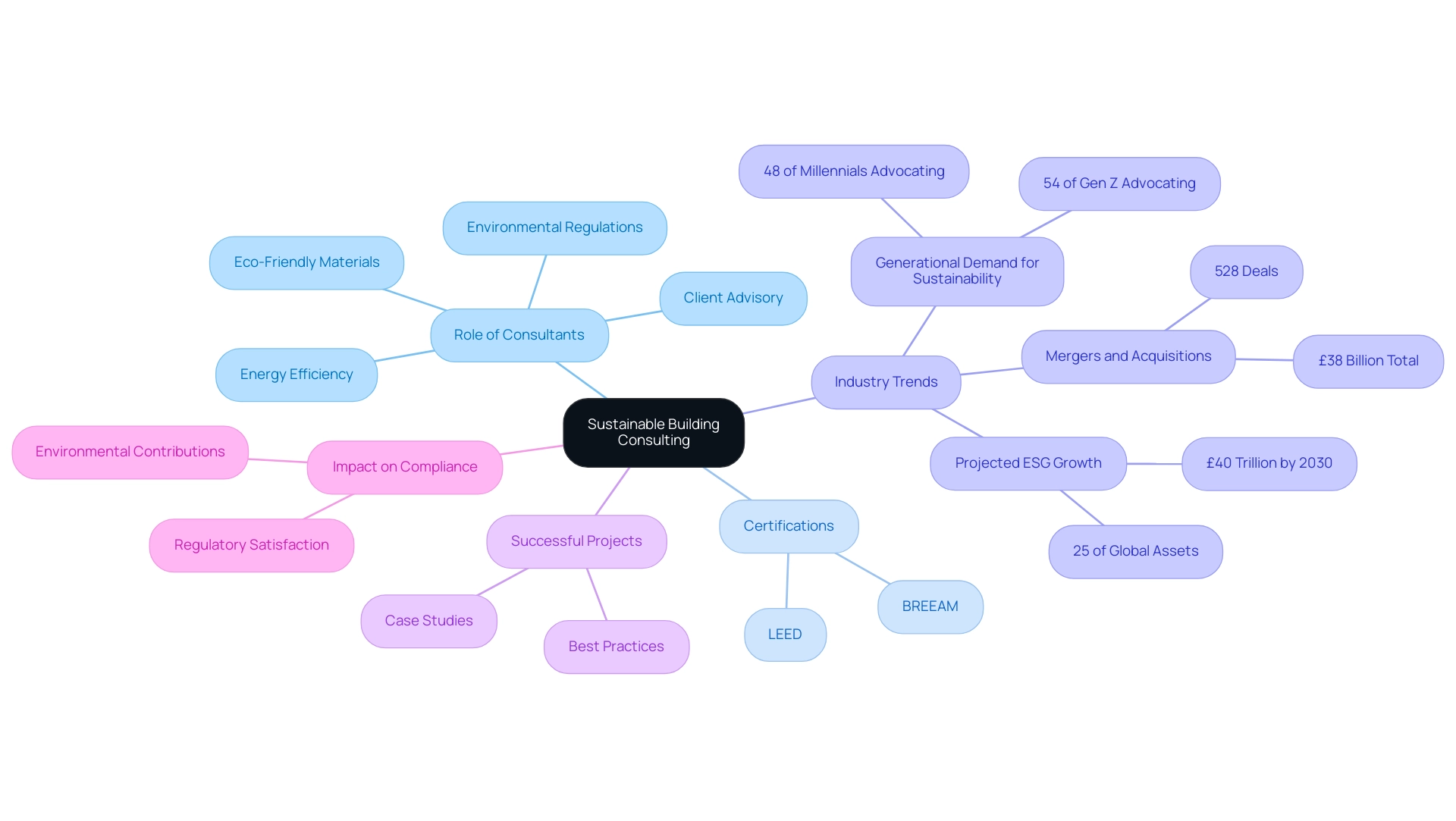
Key Services Provided by Sustainable Building Consultants
Eco-friendly development advisers, such as those at Edmond Shipway, play a crucial role in the industry by offering a suite of specialised services aimed at enhancing environmental performance and ensuring compliance with eco-friendly standards. Their key offerings encompass:
- Sustainability Assessments: These assessments scrutinise the environmental impact of a project, pinpointing areas for improvement and delivering actionable insights that can lead to substantial advancements in sustainability practices.
- Energy Modelling: This service entails analysing energy consumption patterns to optimise efficiency. Effective energy modelling can yield average cost savings of up to 30% in energy expenses for construction projects, establishing it as a vital element of sustainable building consultancy.
- Material Selection: The consultants at Edmond Shipway provide guidance on the selection of eco-friendly materials that not only minimise environmental impact but also ensure durability and longevity, thereby contributing to the project’s overall viability.
- Regulatory Compliance: It is essential for projects to meet local and international environmental standards. Consultants assist in navigating the intricate landscape of regulations, mitigating the risk of non-compliance and the associated costs.
- Certification Assistance: Another critical service involves guiding clients through the process of obtaining green certifications, such as BREEAM. The number of certified residences has impressively increased by nearly 20% from 2023 to 2025, reflecting the rising demand for certified eco-friendly structures, a trend actively supported by environmental consultants.
These services are meticulously designed to aid clients in achieving their environmental goals while ensuring project feasibility and financial viability. Given the recent challenges, including the reported £3.7 billion cost of remediation for structures with life-critical fire safety risks, the role of sustainable building consultants has become increasingly vital. They not only facilitate adherence to evolving regulations but also help mitigate risks associated with environmental impacts, underscoring the need for proactive strategies in construction.
Furthermore, the building sector faces significant hurdles, with 77% of builders identifying ‘Lack of Customer Demand’ as a major barrier to green building initiatives. This underscores the importance of sustainable building consultants in educating clients and stakeholders about the long-term benefits of eco-friendly practices, ultimately enhancing demand for greener solutions in real estate development.
As the industry continues to evolve, the expertise of environmental consultants at Edmond Shipway will be indispensable in shaping a more sustainable future.
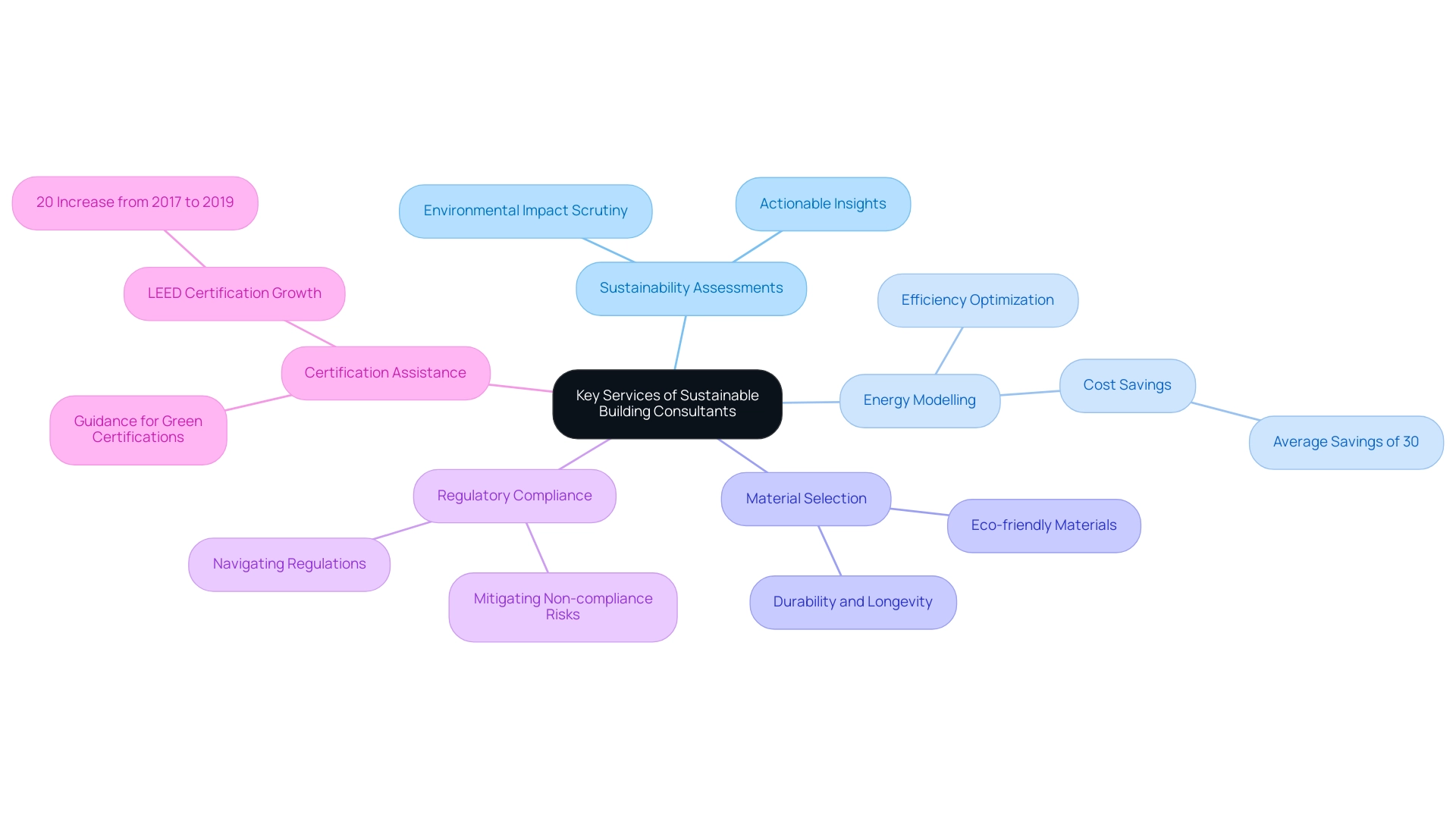
The Growing Importance of Sustainability in Construction
The construction sector is undergoing a significant transformation as eco-friendliness takes centre stage. Key factors driving this transformation include:
- Stringent regulatory requirements
- A growing consumer demand for environmentally friendly buildings
- An urgent response to climate change
By 2025, new regulations will mandate that companies demonstrate their environmental responsibility to secure contracts, underscoring the necessity for compliance with sustainability standards.
This regulatory landscape is not merely a hurdle; it signifies a substantial opportunity for companies that adopt eco-friendly practices. These companies stand to gain competitive advantages, such as attracting investment and securing new contracts, positioning themselves favourably in a rapidly evolving market.
Moreover, the construction industry has seen a concerning 20% rise in fatal construction injuries over the past five years. This alarming statistic highlights the critical need for sustainable practices that not only enhance environmental outcomes but also improve safety and compliance. Investors are increasingly assessing contractors based on their Environmental, Social, and Governance (ESG) performance. A notable rise in green financing options and UK green bond issuance reflects this trend. Sustainable structures are acknowledged for their potential to provide higher returns and lower operational expenses, making them appealing assets in any portfolio.
The head of environmental responsibility and regulation at Constructionline, notes, “This year, there is an increased focus on environmental and social impact, meaning that businesses will need to zero in on their own performance, ensuring that standards are met, measured, and reported accurately.”
At Edmond Shipway, the role of sustainable building consultants is becoming vital as they guide clients through the complexities of regulatory compliance and help them achieve their eco-friendly objectives in this evolving environment. Our expertise in project management and cost efficiency allows us to tailor solutions that not only meet regulatory requirements but also enhance overall project value. Case studies, like the one named ‘Investor & Stakeholder Pressure for Sustainability,’ demonstrate the increasing demand from investors and stakeholders for eco-friendliness, emphasising the significance of minimizing waste and carbon emissions.
As the building sector adapts to these new realities, the role of the sustainable building consultant at Edmond Shipway will be pivotal in shaping a more responsible and resilient built environment.
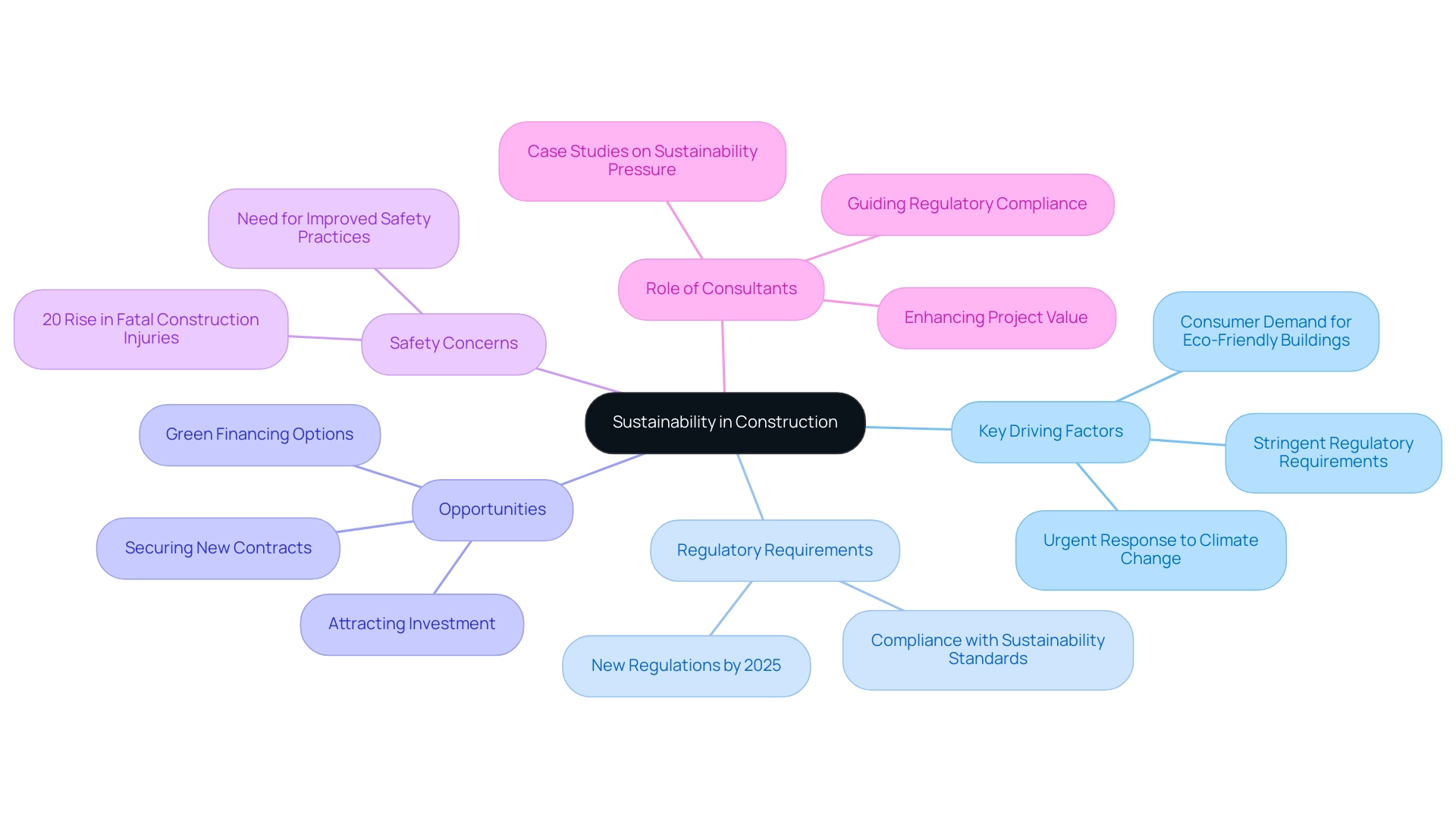
Benefits of Engaging a Sustainable Building Consultant
Engaging a sustainable building consultant presents a multitude of advantages that can significantly impact the success of construction projects, particularly when leveraging the expertise of Edmond Shipway.
Cost Savings: Optimising energy efficiency and selecting sustainable materials can lead to substantial reductions in operational costs. For instance, utilising alternatives like recycled materials can lower CO2 emissions by up to 50%, which translates into reduced energy bills and maintenance costs over time.
Enhanced Project Viability: A sustainable building consultant ensures that projects adhere to sustainability standards, enhancing their appeal to investors and buyers while aligning with the growing market demand for eco-friendly structures. In 2025, eco-friendly buildings are projected to see a marked increase in market value, making them a wise investment choice. Regions that have embraced sustainable construction practices have experienced significant revenue growth, with Europe contributing over 39% of the revenue share in 2024, highlighting the financial benefits of adopting such practices.
Risk Mitigation: Navigating the complexities of regulatory compliance and sustainability challenges is crucial. Sustainable building consultants help minimise the risk of project delays and legal issues, ensuring that projects remain on schedule and within budget. Edmond Shipway’s extensive experience in project management enables effective risk assessment and mitigation strategies tailored to each project.
Enhanced Marketability: Sustainable structures often command higher market values and attract environmentally conscious tenants or buyers. The urgency of addressing climate change in the construction sector is emphasised by industry leaders, who state that “as we assess critical priorities in the fight against climate change, the construction sector clearly demands immediate attention.”
Long-term Sustainability: Consultants provide strategies that not only meet current standards but also anticipate future regulations, ensuring ongoing compliance and relevance in a rapidly evolving market. Edmond Shipway’s dedication to sustainability guarantees that clients are well-prepared for future challenges and opportunities in the building industry.
These advantages emphasise the crucial role that sustainable building consultants, particularly those from Edmond Shipway, play in improving project results, promoting cost reductions, and ensuring long-term viability in the construction industry.

Navigating Challenges in Sustainable Development
Developers frequently face an array of challenges when pursuing eco-friendly building practices, which can impede their projects and overall objectives.
- Higher Initial Costs represent a significant barrier; the upfront investment for sustainable materials and technologies often surpasses that of traditional alternatives. This financial hurdle can deter developers from embracing greener practices, despite the long-term savings and advantages they offer.
- Another critical issue is the Knowledge Gaps present among many stakeholders, including contractors and project managers, who may lack a comprehensive understanding of sustainable practices. This deficiency can result in ineffective implementation and missed opportunities for enhancing environmental responsibility within projects.
- Regulatory Complexity further complicates matters, as the construction sector is subject to a convoluted framework of local, national, and international regulations regarding environmental responsibility. Navigating these requirements can be daunting for developers, potentially causing project delays and increased costs.
- Moreover, there exists Market Resistance, as clients often hesitate to invest in eco-friendly initiatives, influenced by misconceptions about the costs and benefits associated with green building. However, compelling statistics reveal that 84% of residents prioritise living in green homes, and 64% are willing to pay a premium for such communities. This growing demand underscores the importance of integrating eco-friendliness into development projects.
Sustainable building consultants, such as those at Edmond Shipway, play a pivotal role in overcoming these challenges. They provide essential knowledge and training, helping stakeholders understand the significance of eco-friendly practices and navigate regulatory landscapes. For instance, studies indicate that green structures can lead to a 30% reduction in health problems among residents and a 16% increase in productivity, highlighting the tangible benefits of investing in sustainable practices.
This is further substantiated by the case study titled “Health and Productivity Benefits of Green Buildings,” which illustrates the positive effects of eco-friendly practices on worker health and productivity.
By addressing knowledge gaps and providing strategic guidance, the sustainable building consultant team at Edmond Shipway ensures that developers can effectively implement eco-friendly practices, ultimately resulting in improved project outcomes and heightened client satisfaction.
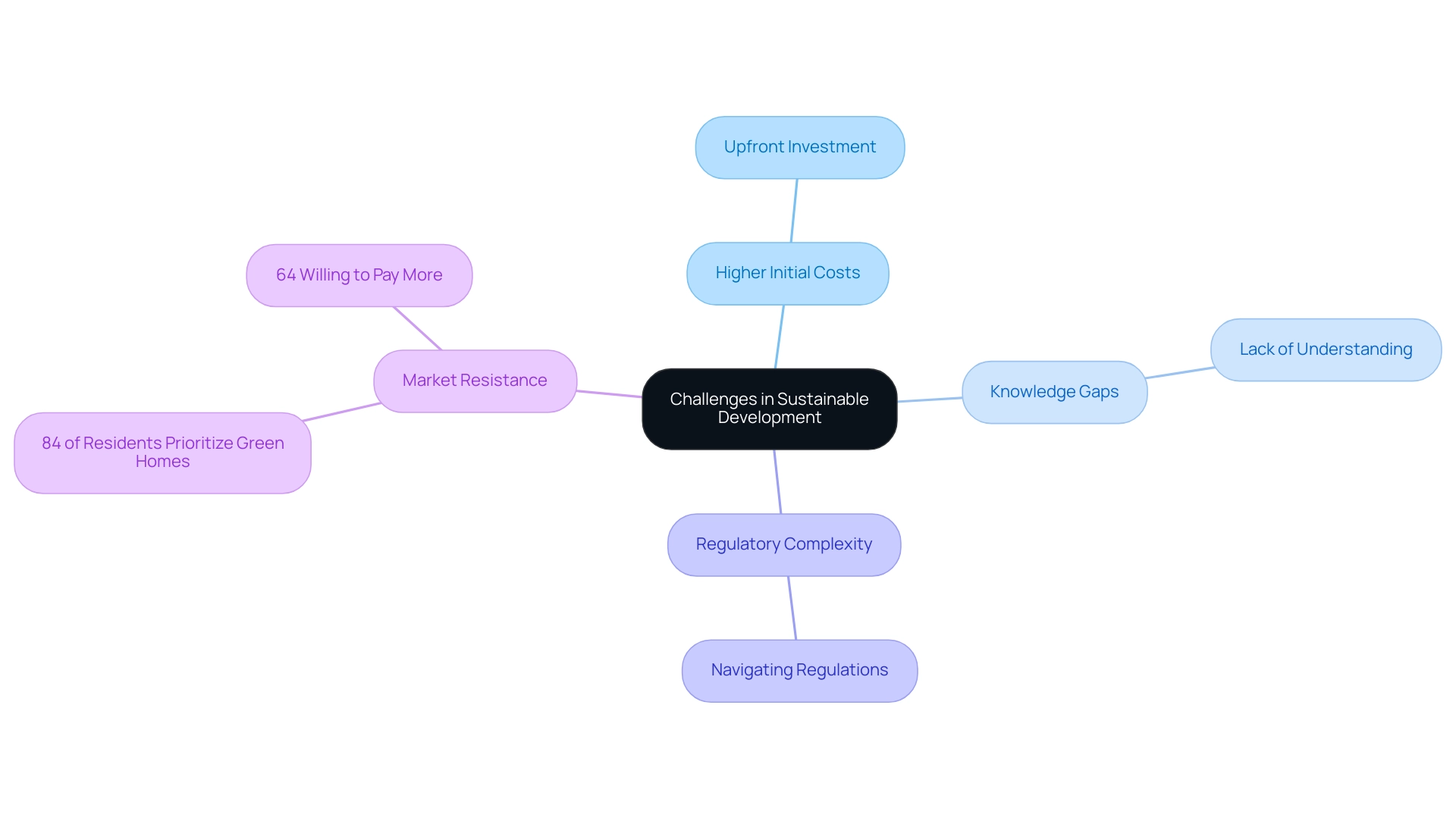
Ensuring Compliance with Sustainability Standards
Eco-friendly project advisors at Edmond Shipway play a crucial role in steering development initiatives toward adherence to various environmental standards and certifications, which are increasingly sought after in today’s market. Key certifications include:
- BREEAM (Building Research Establishment Environmental Assessment Method): As a leading sustainability assessment method, BREEAM evaluates master planning projects, infrastructure, and structures, promoting environmentally responsible design and development practices. Compliance with BREEAM standards has been shown to significantly increase the market value of structures, reflecting a growing demand for certified spaces among developers and tenants.
- ISO 14001: This international standard outlines the requirements for an effective environmental management system, ensuring that organisations can manage their environmental responsibilities systematically. In 2025, statistics indicate that a substantial number of building firms are pursuing ISO 14001 certification, recognising its importance in demonstrating commitment to sustainability.
At Edmond Shipway, our sustainable building consultants not only help clients navigate the complexities of these certification processes but also ensure that all necessary documentation is meticulously prepared. This proactive strategy boosts the project’s credibility and demonstrates a commitment to eco-friendliness, which is increasingly becoming a significant selling point in the competitive real estate market.
The demand for certified structures is on the rise, driven by a notable increase in interest from developers and tenants for environmentally friendly spaces. As the construction industry evolves, certification frameworks must adapt to encompass a broader range of environmental aspects, including energy efficiency, emissions reduction, circularity, health, equity, biodiversity, and resilience. By prioritising these aspects, the sustainable building consultants at Edmond Shipway assist clients in meeting sustainability standards, ultimately contributing to a more environmentally conscious future in construction.
Sustainability certifications are ideal for businesses focusing on occupant well-being, such as offices, healthcare, and educational institutions. This viewpoint corresponds with the increasing tendency among hospitality developers to create areas that not only satisfy regulatory standards but also enhance the experience of their occupants.
Additionally, the case study titled ‘The Role of Certification in Eco-friendly Construction’ demonstrates the importance of certification systems like BREEAM in encouraging environmentally conscious practices and their influence on market value. This strengthens the significance of collaborating with a sustainable building consultant, such as those at Edmond Shipway, to navigate the certification landscape effectively.
The Future of Sustainable Building Consulting
The future of sustainable construction consulting is set for remarkable growth and transformation, driven by several key trends:
- Integration of Technology: The adoption of advanced tools such as information modelling (BIM), energy modelling software, and smart technologies will significantly enhance consultants’ capabilities in designing and implementing sustainable solutions. These technologies not only streamline processes but also improve accuracy in energy efficiency assessments and resource management.
- Circular Economy Practices: A heightened focus on circular economy principles is emerging, emphasising the design of buildings for reuse and recycling. This method seeks to reduce waste during the building process, fostering eco-friendliness by ensuring that materials are reused instead of discarded.
- Increased Regulatory Pressure: With governments around the world enforcing more stringent eco-friendly regulations, the demand for skilled consultants who can adeptly manage these challenges is rising. This regulatory environment necessitates a proactive strategy for compliance, making sustainable building consultants essential resources in the building process.
- Focus on Resilience: Future projects will increasingly prioritise resilience against the impacts of climate change. This entails creating structures capable of withstanding extreme weather events, thereby ensuring longevity and safety for occupants. Furthermore, as building material prices stabilise, companies may find it easier to manage expenses, underscoring the importance of efficient resource distribution for sustainable outcomes.
Together, these trends indicate a promising future for sustainable building consultants, positioning them as vital contributors to the sector’s response to environmental challenges. Additionally, shifting economic conditions, including lower interest rates, are expected to influence project financing costs and encourage investments in eco-friendly construction, underscoring the significance of these trends. As the sector evolves, the integration of technology and sustainable practices will not only enhance project outcomes but also contribute to a more sustainable built environment.
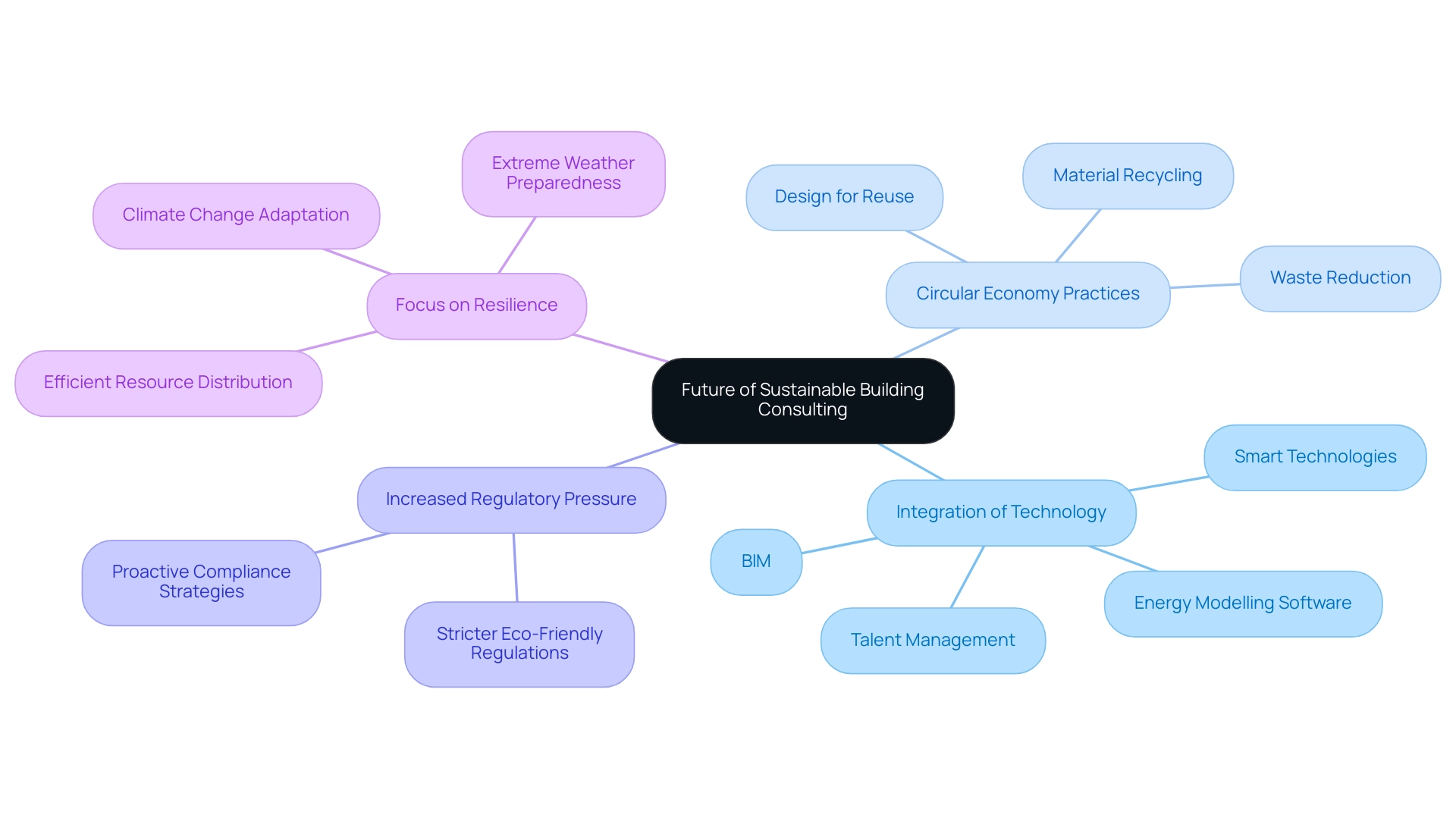
Conclusion
The transformative role of sustainable building consulting in the construction industry is paramount. As the demand for environmentally responsible practices surges, consultants are indispensable in guiding developers through the complexities of sustainable design. They ensure compliance with stringent regulations and assist in achieving prestigious certifications such as BREEAM. Their expertise in energy modelling, materials selection, and risk mitigation not only enhances project viability but also drives significant cost savings and boosts marketability.
Moreover, the increasing emphasis on sustainability is reshaping the industry’s landscape. Younger generations advocate for greener practices, while investors prioritise Environmental, Social, and Governance (ESG) performance. This shift presents both challenges and opportunities for construction firms, underscoring the importance of sustainability consultants in navigating regulatory complexities and addressing market resistance. As the construction sector evolves, these consultants will remain pivotal in overcoming barriers to sustainable development, ensuring that projects are compliant and beneficial to society and the environment.
Looking to the future, sustainable building consulting promises exciting advancements. Driven by technology integration, circular economy principles, and a focus on resilience against climate change, the industry is adapting to new realities. The expertise of sustainable building consultants will be indispensable in shaping a responsible and resilient built environment. By embracing sustainable practices, the construction industry can meet today’s demands and pave the way for a more sustainable future for generations to come.
Share

